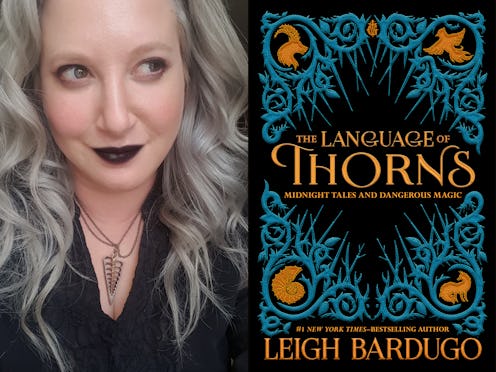
It was five years ago that author Leigh Bardugo released her debut novel and first introduced readers to the Grishaverse, a mythical world of hidden sorcery, seedy crime rings, and enough political unrest to give Game of Thrones a run for its money. That universe — named after the fictional Grisha, a group of humans who practice the "Small Science," or the act of manipulating matter at its most basic form — became the backdrop for the next two novels in her initial trilogy, The Grisha Series, and the two novels in her second series, Six of Crows, which ended last year.
But Bardugo, who most recently released aWonder Woman YA novel, isn't done with the magical, dangerous universe she created quite yet. In her newest book, The Language of Thorns, the #1 New York Times bestselling author delves into the folklore that stitches her world together — the stories passed from generation to generation, around the fire, by the bedside, in books, and in song.
"This was really just a different way of exploring the world I created in the novels," Bardugo tells Bustle. "Instead of pushing into new countries, I’m going deeper, exploring the mythologies of the cultures we’ve already encountered. The stories we choose to tell — about heroes, magic, good and evil — say something about the places we come from. The collection also gave me a chance to play with new magic since the line between reality and myth is blurrier in this type of story."
The Language of Thorns by Leigh Bardugo, $15, Amazon
The book — oversized, adorned with gold lettering, and illustrated in full color by Sara Kipin — is an essential collector's item for any Bardugo reader. But, as the author is quick to note, these stories are not meant to be enjoyed exclusively by fans of her previous work. The folk stories can be enjoyed as simply that — stories.
"There are plenty of easter eggs for longtime readers—and even a character cameo from the trilogy," Bardugo says. "But you don’t need any previous knowledge of the world or the previous books to jump right into these stories. They’re perfect for newcomers or anyone looking for a new kind of fairy tale."
Like the stories of our world — Hansel and Gretel or Little Red Riding Hood or Rapunzel — these folktales do not exist in a vacuum; they address the social and political divides of the Grishaverse, many of which mirror the conflicts of our own world.
"All fantasy operates as metaphor whether we want it to or not," Bardugo says. "There’s no such thing as 'just a book' because what we create in fiction resonates beyond the page. So even when we think we aren’t talking about race or economic disparity or sexism, we are."
In the first story, "Ayama and the Thorn Wood," the titular character — a girl described as "clumsy," "flat-footed," "short," and "round as a beer jug" — is sent by her family to negotiate a peace agreement with the mysterious, murderous beast who haunts their kingdom. Though Ayama does not want to go, she is forced to embark on this dangerous mission in order to secure a reward for her family. But before she leaves, her grandmother tells her, "Come now, Ayama. You know how the stories go. Interesting things only happen to pretty girls; you will be home by sunset." It's a subtle, yet insidious, example of the sexism that pervades their world.... and ours. But Bardugo doesn't allow that mentality to fester in the story.
"When Ayama’s grandmother makes that statement about beauty, the narrator leaves it unchallenged, but the narrative does not," Bardugo says. "And I think that’s what matters. We invariably create worlds burdened by some of the same issues as our own, so we have to be aware of the messages we may be sending, and we have to make conscientious choices about leaving those problems unexamined or unchallenged in the text."
For readers of Bardugo's work, what will be perhaps most exciting is the idea that these are the stories that nourished and informed their favorite characters from The Grisha Series and Six of Crows.
"I can easily imagine Jesper’s mother telling him 'Ayama and the Thorn Wood' as she tucked him in late at night," Bardugo says. "Or a young Kaz puzzling over 'The Soldier Prince' and looking for the clocksmith’s mysterious shop on the streets of Ketterdam. The Darkling is more complicated because he would recognize some of the witches of these tales as Grisha themselves."
This isn't the last time fans can experience the world of the Grisha; as announced on Tuesday morning, Bardugo will return to it yet again in 2019 with the release of King of Scars, a continuation of King Nikolai Lantsov's story. But until then, readers can turn to these mythical tales again and again — and find new inspiration in them with each and every reading.